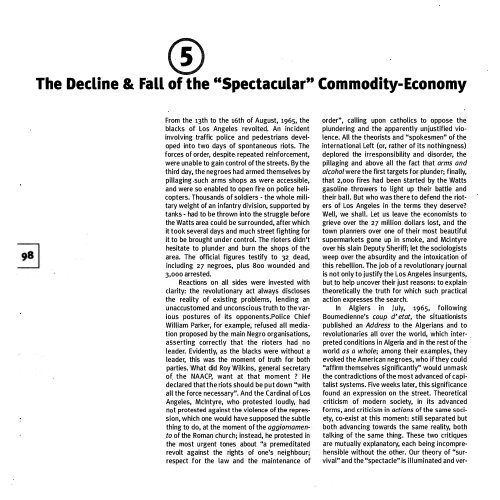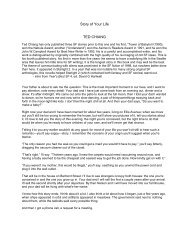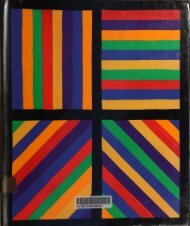SITUATIONISTS AND THE 1£CH MAY 1968
umMYFs
umMYFs
You also want an ePaper? Increase the reach of your titles
YUMPU automatically turns print PDFs into web optimized ePapers that Google loves.
®<br />
The Decline & Fall of the "Spectacular" Commodity- Economy<br />
From the 13th to the 16th of August, 1965, the<br />
blacks of Los Angeles revolted. An incident<br />
involving traffic police and pedestrians developed<br />
into two days of spontaneous riots. The<br />
forces of order, despite repeated reinforcement,<br />
were unable to gain control of the streets. By the<br />
third day, the negroes had armed themselves by<br />
pillaging such arms shops as were accessible,<br />
and were so enabled to open fire on police helicopters.<br />
Thousands of soldiers - the whole military<br />
weight of an infantry division, supported by<br />
tanks - had to be thrown into the struggle before<br />
the Watts area could be surrounded, after which<br />
it took several days and much street fighting for<br />
it to be brought under control. The rioters didn't<br />
hesitate to plunder and burn the shops of the<br />
area. The official figures testify to 32 dead,<br />
including 27 negroes, plus Soo wounded and<br />
3,ooo arrested.<br />
Reactions on all sides were invested with<br />
clarity: the revolutionary act always discloses<br />
the reality of existing problems, lending an<br />
unaccustomed and unconscious truth to the various<br />
postures of its opponents.Police Chief<br />
William Parker, for example, refused all mediation<br />
proposed by the main Negro organisations,<br />
asserting correctly that the rioters had no<br />
leader. Evidently, as the blacks were without a<br />
leader, this was the moment of truth for both<br />
parties. What did Roy Wilkins, general secretary<br />
of the NAACP, want at that moment ? He<br />
declared that the riots should be put down "with<br />
all the force necessary". And the Cardinal of Los<br />
Angeles, Mclntyre, who protested loudly; had<br />
not protested against the violence of the repression,<br />
which one would have supposed the subtle<br />
thing to do, at the moment of the aggiornamento<br />
of the Roman church; instead, he protested in<br />
the most urgent tones about "a premeditated<br />
revolt against the rights of one's . neighbour;<br />
respect for the law and the maintenance of<br />
order", calling upon catholics to oppose the<br />
plundering and the apparently unjustified violence.<br />
All the theorists and "spokesmen" of the<br />
international Left (or, rather of its nothingness)<br />
deplored the irresponsibility and disorder, the<br />
pillaging and above all the fact that arms and<br />
alcohol were the first targets for plunder; finally,<br />
that 2,ooo fires had been started by the Watts<br />
gasoline throwers to light up their battle and<br />
their ball. But who was there to defend the rioters<br />
of Los Angeles in the terms they deserve?<br />
Well, we shall. Let us leave the economists to<br />
grieve over the 27 million dollars lost, and the<br />
town planners over one of their most beautiful<br />
supermarkets gone up in smoke, and Mclntyre<br />
over his slain Deputy Sheriff; let the sociologists<br />
weep over the absurdity and the intoxication of<br />
this rebellion. The job of a revolutionary journal<br />
is not only to justify the Los Angeles insurgents,<br />
but to help uncover their just reasons: to explain<br />
theoretically the truth for which such practical<br />
action expresses the search.<br />
In Algiers in July, 1965, following<br />
Boumedienne's coup d' etat, the situationists<br />
published an Address to the Algerians and to<br />
revolutionaries all over the world, which inter- .<br />
preted conditions in Algeria and in the rest of the<br />
world as a whole; among their examples, they<br />
evoked the American negroes, who if they could<br />
"affirm themselves significantly" would unmask<br />
the contradictions of the most advanced of capitalist<br />
systems. Five weeks later, this significance<br />
found an expression on the street. Theoretical<br />
criticism of modern society, in its advanced<br />
forms, and criticism in actions of the same society,<br />
co-exist at this moment: still separated but<br />
both advancing towards the same reality, both<br />
talking of the same thing. These two critiques<br />
are mutually explanatory, each being incpmprehensible<br />
without the other. Our theory of "survival"<br />
and the "spectacle" is illuminated and ver-










